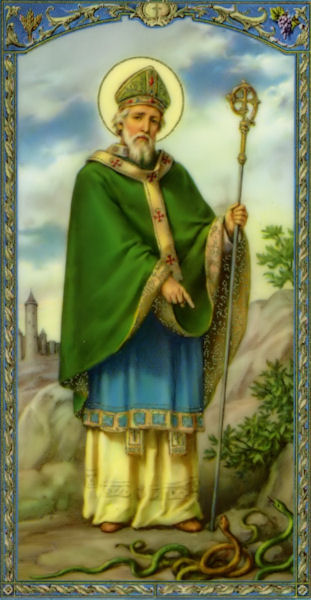 |
If the virtue of children reflects honor on their parents, much more justly is the name of Saint Patrick rendered illustrious by the innumerable lights of sanctity which shone in the Church of Ireland during many ages, and by the colonies of Saints with which it peopled many foreign countries. The Apostle of Ireland was born in Scotland towards the close of the fourth century, in a village which seems to be the present-day Scotch town of Kilpatrick, between Dumbarton and Glasgow. He calls himself both a Briton and a Roman, that is, of mixed extraction, and says his father was of a good family named Calphurnius. Some writers call his mother Conchessa, and say she was the niece of Saint Martin of Tours. In his sixteenth year he was carried into captivity in Ireland by barbarians. There he was obliged to shepherd cattle on the mountains and in the forests, in hunger and nakedness, amid snow, rain, and ice. The young man had recourse to God with his whole heart, in fervent prayer and fasting, and from that time faith and the love of God acquired a constantly renewed strength in his tender soul. |
Some years afterwards he was again taken captive, but recovered his liberty after two months. While he was at home with his parents, God manifested to him, by divers visions, that He destined him for the great work of the conversion of Ireland. His biographers say that after his second captivity he traveled into Gaul and Italy, and saw Saint Martin, Saint Germanus of Auxerre, and Pope Saint Celestine, and that he received his mission and the apostolical benediction from this Pope, who died in 432. It is certain that he spent many years in preparing himself for his sacred calling. Great opposition was raised to his episcopal consecration and mission, both by his own relatives and by the clergy. They made him great offers in order to detain him among them, and endeavored to affright him by exaggerating the dangers to which he exposed himself amid the enemies of the Romans and Britons, who did not know God. All these temptations cast the Saint into great perplexity; but the Lord, whose Will he consulted by earnest prayer, supported him and he persevered in his resolution.
He therefore left his family, sold his birthright and dignity, and consecrated his soul to God, to serve strangers and carry His name to the ends of the earth. In this disposition he passed into Ireland, to preach the Gospel where the worship of idols still generally reigned. He traveled over the island, penetrating into the remotest corners, and such was the fruit of his preaching and sufferings that he baptized an infinite number of persons. Everywhere he ordained clergymen, induced women to live in holy widowhood and continence, consecrated virgins to Christ, and founded monasteries, not without many persecutions.
Saint Patrick held several councils to regulate the discipline of the Church he had planted. Saint Bernard and the tradition of the country testify that he fixed his metropolitan see at Armagh. He established other bishops, as appears by the acts of a council and various other documents. He not only converted the whole country by his preaching and wonderful miracles, but also cultivated this vineyard with so fruitful a benediction from heaven as to render Ireland a flourishing garden in the Church of God, and a land of Saints. He converted and baptized the kings of Dublin and Munster and the seven sons of the king of Connaught, with the majority of their subjects, and before his death almost the whole island. He founded three monasteries and filled the countryside with churches and schools of piety and learning. He died and was buried at Down in Ulster. His body was found there in a church of his name in 1185, and moved to another part of the same church.
Reflection. By the instrumentality of Saint Patrick the Faith remained for long centuries as fresh in Ireland as when it was first planted. Ask him to obtain for you the special grace his children receive: to prefer the loss of every earthly good to the least compromise in matters of faith.

No comments:
Post a Comment
Place your comment. The moderator will review it after it is published. We reserve the right to delete any comment for any reason.